Literary Analysis: Analyzing Status and Haunting in Two Literary Works
VerifiedAdded on 2023/04/06
|9
|1757
|261
Essay
AI Summary
This essay provides a literary analysis of Toni Cade Bambara's "The Lesson" and Virginia Woolf's "Street, Haunting." The analysis of "The Lesson" focuses on the portrayal of social status, class inequality, and the struggles of African-American children, highlighting the impact of economic disparities an...
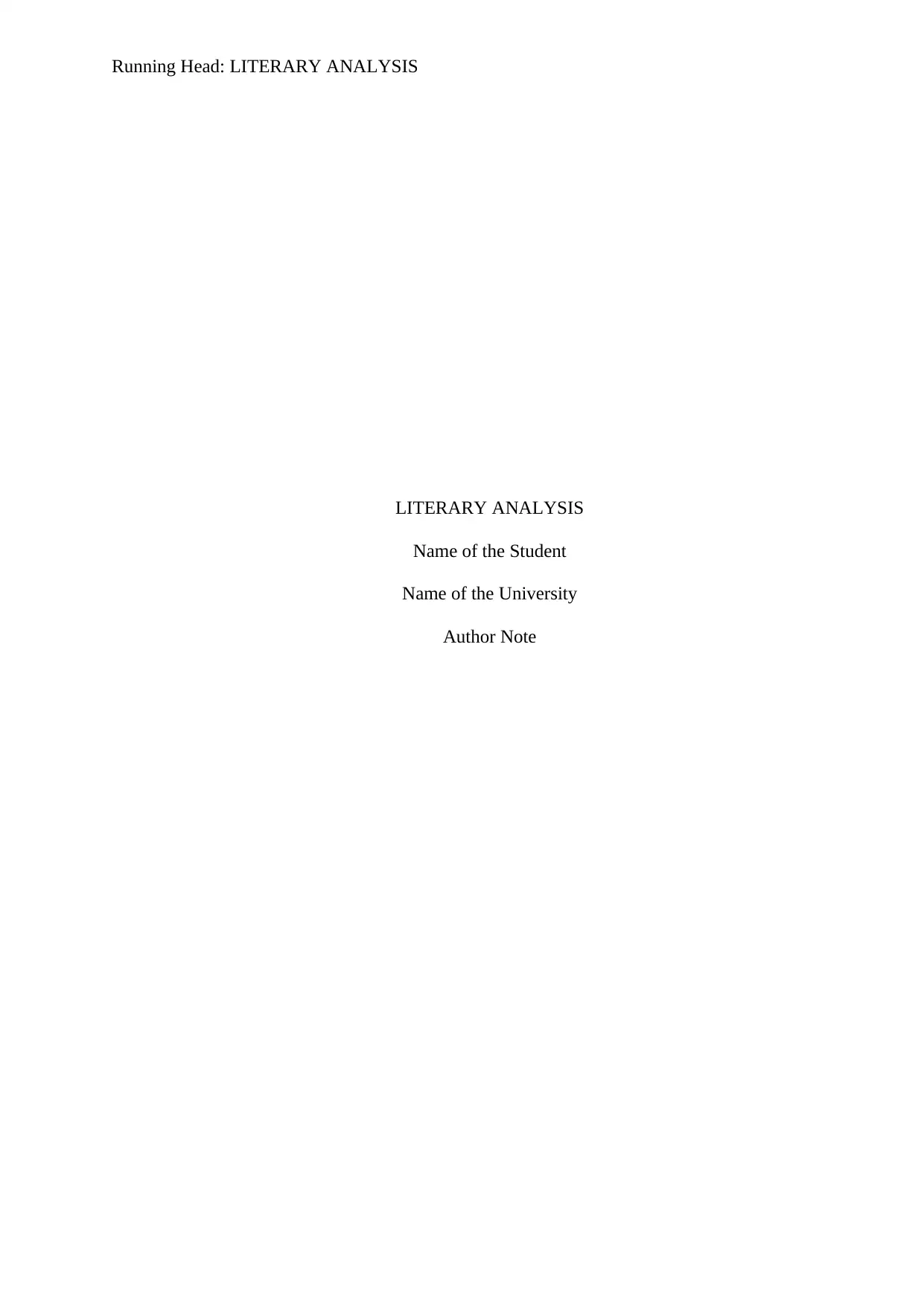
Running Head: LITERARY ANALYSIS
LITERARY ANALYSIS
Name of the Student
Name of the University
Author Note
LITERARY ANALYSIS
Name of the Student
Name of the University
Author Note
Paraphrase This Document
Need a fresh take? Get an instant paraphrase of this document with our AI Paraphraser
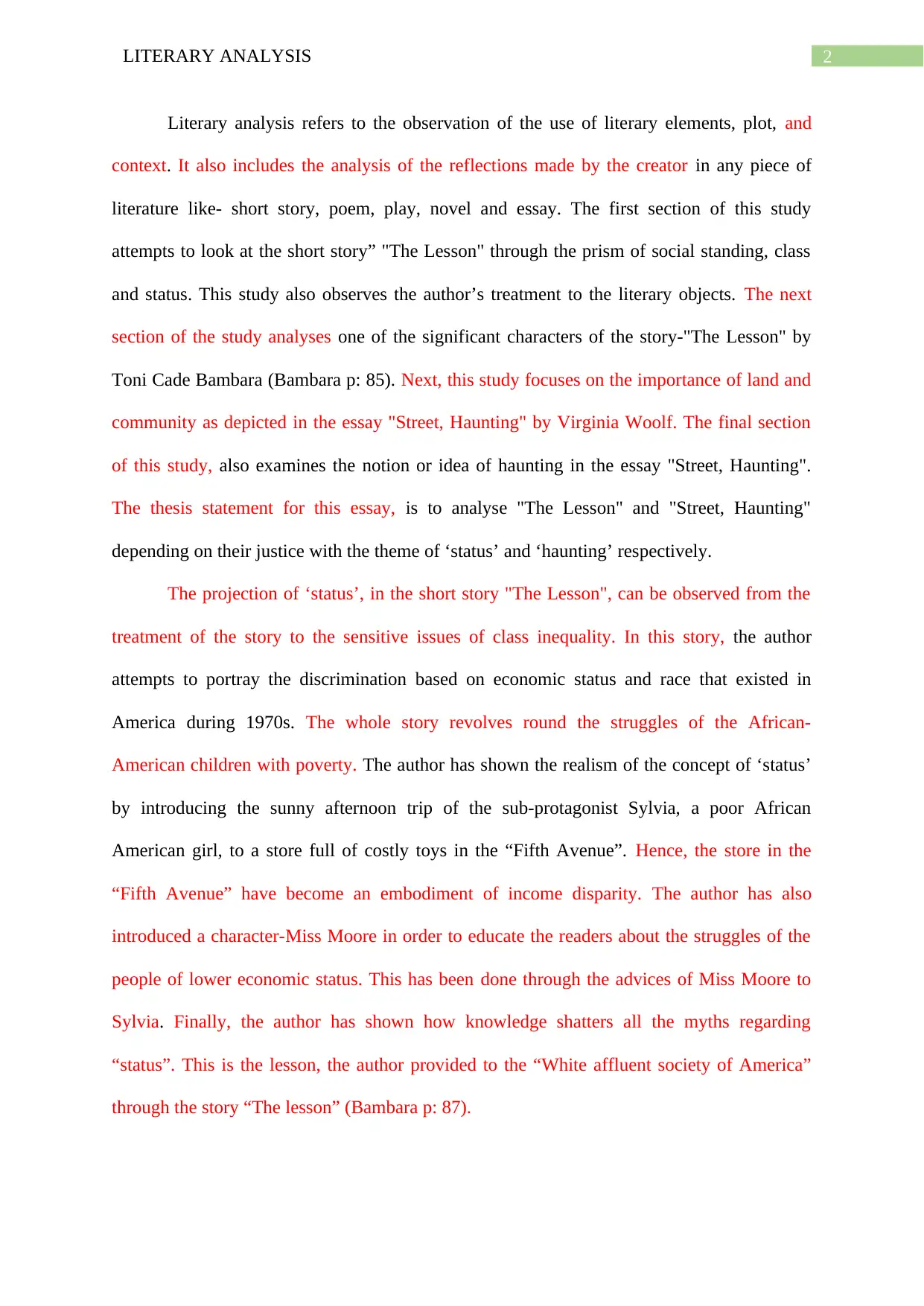
2LITERARY ANALYSIS
Literary analysis refers to the observation of the use of literary elements, plot, and
context. It also includes the analysis of the reflections made by the creator in any piece of
literature like- short story, poem, play, novel and essay. The first section of this study
attempts to look at the short story” "The Lesson" through the prism of social standing, class
and status. This study also observes the author’s treatment to the literary objects. The next
section of the study analyses one of the significant characters of the story-"The Lesson" by
Toni Cade Bambara (Bambara p: 85). Next, this study focuses on the importance of land and
community as depicted in the essay "Street, Haunting" by Virginia Woolf. The final section
of this study, also examines the notion or idea of haunting in the essay "Street, Haunting".
The thesis statement for this essay, is to analyse "The Lesson" and "Street, Haunting"
depending on their justice with the theme of ‘status’ and ‘haunting’ respectively.
The projection of ‘status’, in the short story "The Lesson", can be observed from the
treatment of the story to the sensitive issues of class inequality. In this story, the author
attempts to portray the discrimination based on economic status and race that existed in
America during 1970s. The whole story revolves round the struggles of the African-
American children with poverty. The author has shown the realism of the concept of ‘status’
by introducing the sunny afternoon trip of the sub-protagonist Sylvia, a poor African
American girl, to a store full of costly toys in the “Fifth Avenue”. Hence, the store in the
“Fifth Avenue” have become an embodiment of income disparity. The author has also
introduced a character-Miss Moore in order to educate the readers about the struggles of the
people of lower economic status. This has been done through the advices of Miss Moore to
Sylvia. Finally, the author has shown how knowledge shatters all the myths regarding
“status”. This is the lesson, the author provided to the “White affluent society of America”
through the story “The lesson” (Bambara p: 87).
Literary analysis refers to the observation of the use of literary elements, plot, and
context. It also includes the analysis of the reflections made by the creator in any piece of
literature like- short story, poem, play, novel and essay. The first section of this study
attempts to look at the short story” "The Lesson" through the prism of social standing, class
and status. This study also observes the author’s treatment to the literary objects. The next
section of the study analyses one of the significant characters of the story-"The Lesson" by
Toni Cade Bambara (Bambara p: 85). Next, this study focuses on the importance of land and
community as depicted in the essay "Street, Haunting" by Virginia Woolf. The final section
of this study, also examines the notion or idea of haunting in the essay "Street, Haunting".
The thesis statement for this essay, is to analyse "The Lesson" and "Street, Haunting"
depending on their justice with the theme of ‘status’ and ‘haunting’ respectively.
The projection of ‘status’, in the short story "The Lesson", can be observed from the
treatment of the story to the sensitive issues of class inequality. In this story, the author
attempts to portray the discrimination based on economic status and race that existed in
America during 1970s. The whole story revolves round the struggles of the African-
American children with poverty. The author has shown the realism of the concept of ‘status’
by introducing the sunny afternoon trip of the sub-protagonist Sylvia, a poor African
American girl, to a store full of costly toys in the “Fifth Avenue”. Hence, the store in the
“Fifth Avenue” have become an embodiment of income disparity. The author has also
introduced a character-Miss Moore in order to educate the readers about the struggles of the
people of lower economic status. This has been done through the advices of Miss Moore to
Sylvia. Finally, the author has shown how knowledge shatters all the myths regarding
“status”. This is the lesson, the author provided to the “White affluent society of America”
through the story “The lesson” (Bambara p: 87).
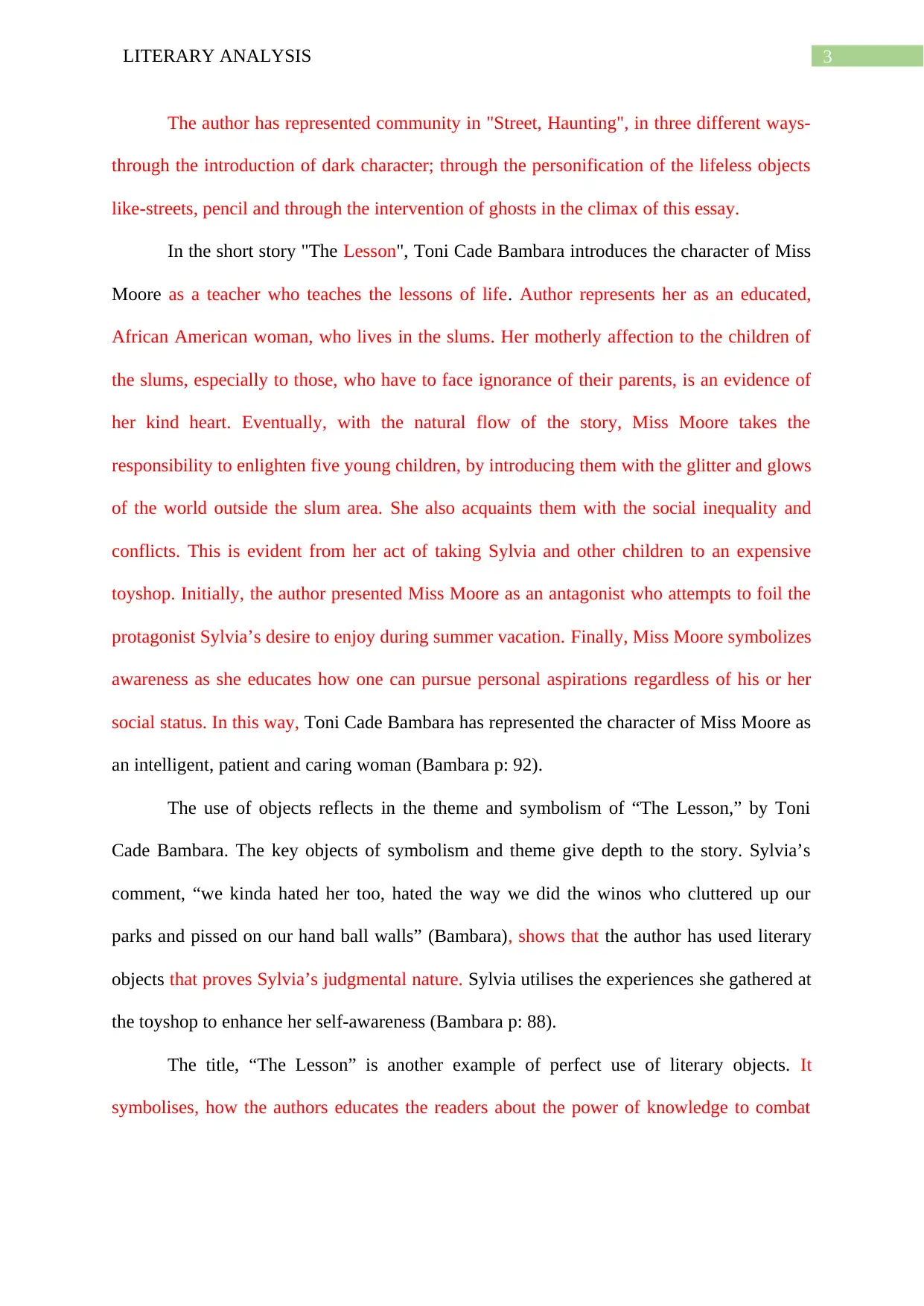
3LITERARY ANALYSIS
The author has represented community in "Street, Haunting", in three different ways-
through the introduction of dark character; through the personification of the lifeless objects
like-streets, pencil and through the intervention of ghosts in the climax of this essay.
In the short story "The Lesson", Toni Cade Bambara introduces the character of Miss
Moore as a teacher who teaches the lessons of life. Author represents her as an educated,
African American woman, who lives in the slums. Her motherly affection to the children of
the slums, especially to those, who have to face ignorance of their parents, is an evidence of
her kind heart. Eventually, with the natural flow of the story, Miss Moore takes the
responsibility to enlighten five young children, by introducing them with the glitter and glows
of the world outside the slum area. She also acquaints them with the social inequality and
conflicts. This is evident from her act of taking Sylvia and other children to an expensive
toyshop. Initially, the author presented Miss Moore as an antagonist who attempts to foil the
protagonist Sylvia’s desire to enjoy during summer vacation. Finally, Miss Moore symbolizes
awareness as she educates how one can pursue personal aspirations regardless of his or her
social status. In this way, Toni Cade Bambara has represented the character of Miss Moore as
an intelligent, patient and caring woman (Bambara p: 92).
The use of objects reflects in the theme and symbolism of “The Lesson,” by Toni
Cade Bambara. The key objects of symbolism and theme give depth to the story. Sylvia’s
comment, “we kinda hated her too, hated the way we did the winos who cluttered up our
parks and pissed on our hand ball walls” (Bambara), shows that the author has used literary
objects that proves Sylvia’s judgmental nature. Sylvia utilises the experiences she gathered at
the toyshop to enhance her self-awareness (Bambara p: 88).
The title, “The Lesson” is another example of perfect use of literary objects. It
symbolises, how the authors educates the readers about the power of knowledge to combat
The author has represented community in "Street, Haunting", in three different ways-
through the introduction of dark character; through the personification of the lifeless objects
like-streets, pencil and through the intervention of ghosts in the climax of this essay.
In the short story "The Lesson", Toni Cade Bambara introduces the character of Miss
Moore as a teacher who teaches the lessons of life. Author represents her as an educated,
African American woman, who lives in the slums. Her motherly affection to the children of
the slums, especially to those, who have to face ignorance of their parents, is an evidence of
her kind heart. Eventually, with the natural flow of the story, Miss Moore takes the
responsibility to enlighten five young children, by introducing them with the glitter and glows
of the world outside the slum area. She also acquaints them with the social inequality and
conflicts. This is evident from her act of taking Sylvia and other children to an expensive
toyshop. Initially, the author presented Miss Moore as an antagonist who attempts to foil the
protagonist Sylvia’s desire to enjoy during summer vacation. Finally, Miss Moore symbolizes
awareness as she educates how one can pursue personal aspirations regardless of his or her
social status. In this way, Toni Cade Bambara has represented the character of Miss Moore as
an intelligent, patient and caring woman (Bambara p: 92).
The use of objects reflects in the theme and symbolism of “The Lesson,” by Toni
Cade Bambara. The key objects of symbolism and theme give depth to the story. Sylvia’s
comment, “we kinda hated her too, hated the way we did the winos who cluttered up our
parks and pissed on our hand ball walls” (Bambara), shows that the author has used literary
objects that proves Sylvia’s judgmental nature. Sylvia utilises the experiences she gathered at
the toyshop to enhance her self-awareness (Bambara p: 88).
The title, “The Lesson” is another example of perfect use of literary objects. It
symbolises, how the authors educates the readers about the power of knowledge to combat
⊘ This is a preview!⊘
Do you want full access?
Subscribe today to unlock all pages.

Trusted by 1+ million students worldwide
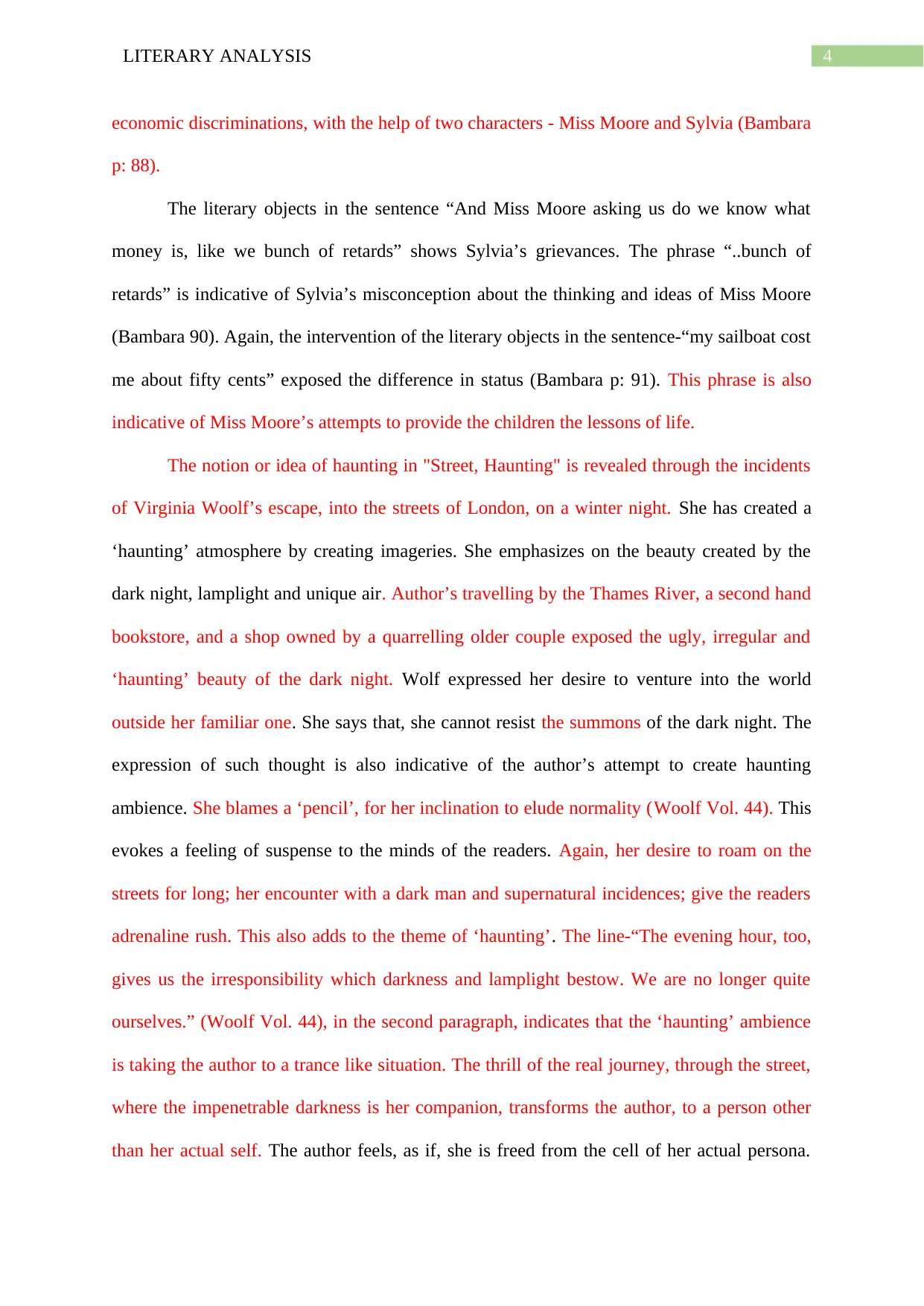
4LITERARY ANALYSIS
economic discriminations, with the help of two characters - Miss Moore and Sylvia (Bambara
p: 88).
The literary objects in the sentence “And Miss Moore asking us do we know what
money is, like we bunch of retards” shows Sylvia’s grievances. The phrase “..bunch of
retards” is indicative of Sylvia’s misconception about the thinking and ideas of Miss Moore
(Bambara 90). Again, the intervention of the literary objects in the sentence-“my sailboat cost
me about fifty cents” exposed the difference in status (Bambara p: 91). This phrase is also
indicative of Miss Moore’s attempts to provide the children the lessons of life.
The notion or idea of haunting in "Street, Haunting" is revealed through the incidents
of Virginia Woolf’s escape, into the streets of London, on a winter night. She has created a
‘haunting’ atmosphere by creating imageries. She emphasizes on the beauty created by the
dark night, lamplight and unique air. Author’s travelling by the Thames River, a second hand
bookstore, and a shop owned by a quarrelling older couple exposed the ugly, irregular and
‘haunting’ beauty of the dark night. Wolf expressed her desire to venture into the world
outside her familiar one. She says that, she cannot resist the summons of the dark night. The
expression of such thought is also indicative of the author’s attempt to create haunting
ambience. She blames a ‘pencil’, for her inclination to elude normality (Woolf Vol. 44). This
evokes a feeling of suspense to the minds of the readers. Again, her desire to roam on the
streets for long; her encounter with a dark man and supernatural incidences; give the readers
adrenaline rush. This also adds to the theme of ‘haunting’. The line-“The evening hour, too,
gives us the irresponsibility which darkness and lamplight bestow. We are no longer quite
ourselves.” (Woolf Vol. 44), in the second paragraph, indicates that the ‘haunting’ ambience
is taking the author to a trance like situation. The thrill of the real journey, through the street,
where the impenetrable darkness is her companion, transforms the author, to a person other
than her actual self. The author feels, as if, she is freed from the cell of her actual persona.
economic discriminations, with the help of two characters - Miss Moore and Sylvia (Bambara
p: 88).
The literary objects in the sentence “And Miss Moore asking us do we know what
money is, like we bunch of retards” shows Sylvia’s grievances. The phrase “..bunch of
retards” is indicative of Sylvia’s misconception about the thinking and ideas of Miss Moore
(Bambara 90). Again, the intervention of the literary objects in the sentence-“my sailboat cost
me about fifty cents” exposed the difference in status (Bambara p: 91). This phrase is also
indicative of Miss Moore’s attempts to provide the children the lessons of life.
The notion or idea of haunting in "Street, Haunting" is revealed through the incidents
of Virginia Woolf’s escape, into the streets of London, on a winter night. She has created a
‘haunting’ atmosphere by creating imageries. She emphasizes on the beauty created by the
dark night, lamplight and unique air. Author’s travelling by the Thames River, a second hand
bookstore, and a shop owned by a quarrelling older couple exposed the ugly, irregular and
‘haunting’ beauty of the dark night. Wolf expressed her desire to venture into the world
outside her familiar one. She says that, she cannot resist the summons of the dark night. The
expression of such thought is also indicative of the author’s attempt to create haunting
ambience. She blames a ‘pencil’, for her inclination to elude normality (Woolf Vol. 44). This
evokes a feeling of suspense to the minds of the readers. Again, her desire to roam on the
streets for long; her encounter with a dark man and supernatural incidences; give the readers
adrenaline rush. This also adds to the theme of ‘haunting’. The line-“The evening hour, too,
gives us the irresponsibility which darkness and lamplight bestow. We are no longer quite
ourselves.” (Woolf Vol. 44), in the second paragraph, indicates that the ‘haunting’ ambience
is taking the author to a trance like situation. The thrill of the real journey, through the street,
where the impenetrable darkness is her companion, transforms the author, to a person other
than her actual self. The author feels, as if, she is freed from the cell of her actual persona.
Paraphrase This Document
Need a fresh take? Get an instant paraphrase of this document with our AI Paraphraser
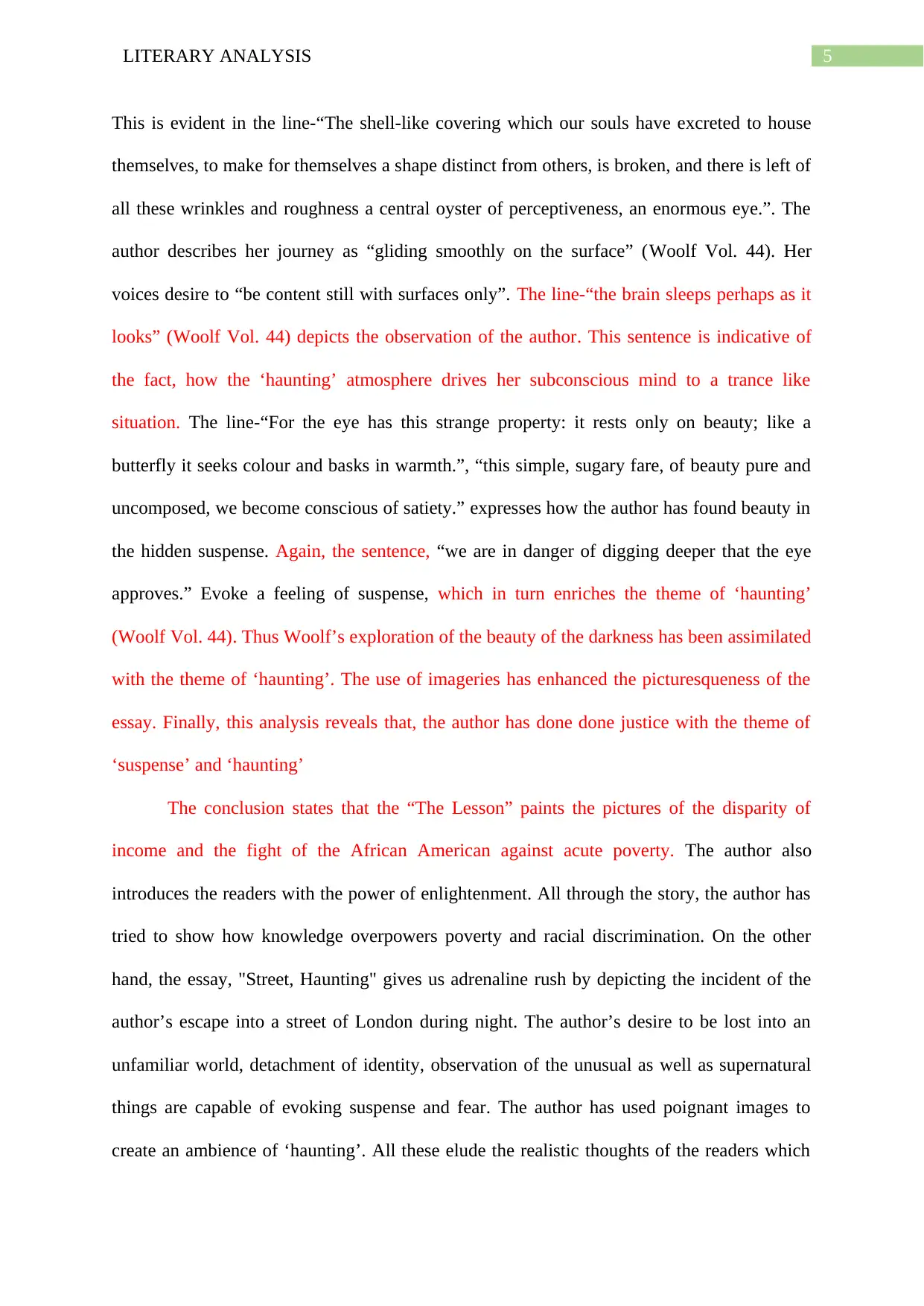
5LITERARY ANALYSIS
This is evident in the line-“The shell-like covering which our souls have excreted to house
themselves, to make for themselves a shape distinct from others, is broken, and there is left of
all these wrinkles and roughness a central oyster of perceptiveness, an enormous eye.”. The
author describes her journey as “gliding smoothly on the surface” (Woolf Vol. 44). Her
voices desire to “be content still with surfaces only”. The line-“the brain sleeps perhaps as it
looks” (Woolf Vol. 44) depicts the observation of the author. This sentence is indicative of
the fact, how the ‘haunting’ atmosphere drives her subconscious mind to a trance like
situation. The line-“For the eye has this strange property: it rests only on beauty; like a
butterfly it seeks colour and basks in warmth.”, “this simple, sugary fare, of beauty pure and
uncomposed, we become conscious of satiety.” expresses how the author has found beauty in
the hidden suspense. Again, the sentence, “we are in danger of digging deeper that the eye
approves.” Evoke a feeling of suspense, which in turn enriches the theme of ‘haunting’
(Woolf Vol. 44). Thus Woolf’s exploration of the beauty of the darkness has been assimilated
with the theme of ‘haunting’. The use of imageries has enhanced the picturesqueness of the
essay. Finally, this analysis reveals that, the author has done done justice with the theme of
‘suspense’ and ‘haunting’
The conclusion states that the “The Lesson” paints the pictures of the disparity of
income and the fight of the African American against acute poverty. The author also
introduces the readers with the power of enlightenment. All through the story, the author has
tried to show how knowledge overpowers poverty and racial discrimination. On the other
hand, the essay, "Street, Haunting" gives us adrenaline rush by depicting the incident of the
author’s escape into a street of London during night. The author’s desire to be lost into an
unfamiliar world, detachment of identity, observation of the unusual as well as supernatural
things are capable of evoking suspense and fear. The author has used poignant images to
create an ambience of ‘haunting’. All these elude the realistic thoughts of the readers which
This is evident in the line-“The shell-like covering which our souls have excreted to house
themselves, to make for themselves a shape distinct from others, is broken, and there is left of
all these wrinkles and roughness a central oyster of perceptiveness, an enormous eye.”. The
author describes her journey as “gliding smoothly on the surface” (Woolf Vol. 44). Her
voices desire to “be content still with surfaces only”. The line-“the brain sleeps perhaps as it
looks” (Woolf Vol. 44) depicts the observation of the author. This sentence is indicative of
the fact, how the ‘haunting’ atmosphere drives her subconscious mind to a trance like
situation. The line-“For the eye has this strange property: it rests only on beauty; like a
butterfly it seeks colour and basks in warmth.”, “this simple, sugary fare, of beauty pure and
uncomposed, we become conscious of satiety.” expresses how the author has found beauty in
the hidden suspense. Again, the sentence, “we are in danger of digging deeper that the eye
approves.” Evoke a feeling of suspense, which in turn enriches the theme of ‘haunting’
(Woolf Vol. 44). Thus Woolf’s exploration of the beauty of the darkness has been assimilated
with the theme of ‘haunting’. The use of imageries has enhanced the picturesqueness of the
essay. Finally, this analysis reveals that, the author has done done justice with the theme of
‘suspense’ and ‘haunting’
The conclusion states that the “The Lesson” paints the pictures of the disparity of
income and the fight of the African American against acute poverty. The author also
introduces the readers with the power of enlightenment. All through the story, the author has
tried to show how knowledge overpowers poverty and racial discrimination. On the other
hand, the essay, "Street, Haunting" gives us adrenaline rush by depicting the incident of the
author’s escape into a street of London during night. The author’s desire to be lost into an
unfamiliar world, detachment of identity, observation of the unusual as well as supernatural
things are capable of evoking suspense and fear. The author has used poignant images to
create an ambience of ‘haunting’. All these elude the realistic thoughts of the readers which
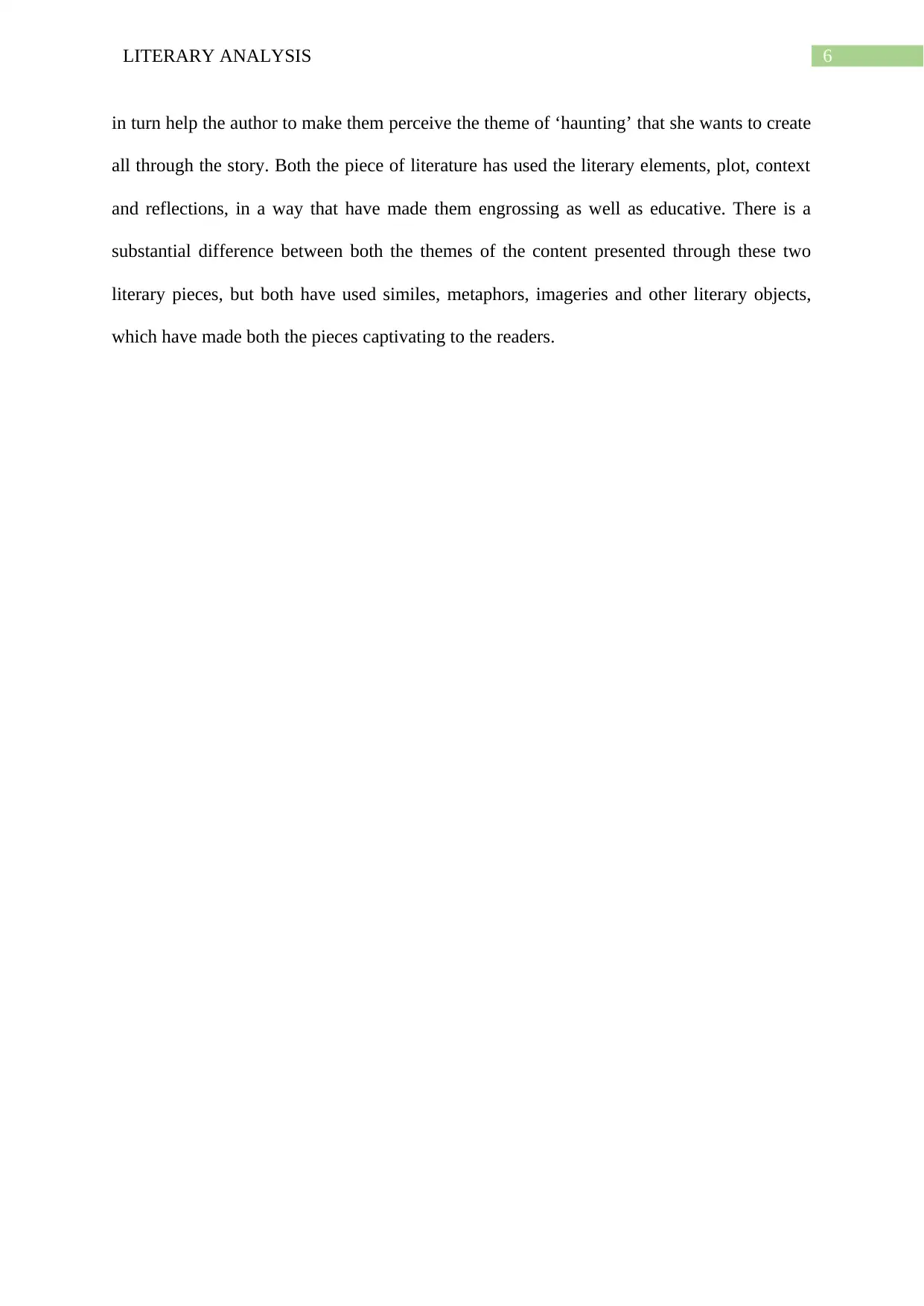
6LITERARY ANALYSIS
in turn help the author to make them perceive the theme of ‘haunting’ that she wants to create
all through the story. Both the piece of literature has used the literary elements, plot, context
and reflections, in a way that have made them engrossing as well as educative. There is a
substantial difference between both the themes of the content presented through these two
literary pieces, but both have used similes, metaphors, imageries and other literary objects,
which have made both the pieces captivating to the readers.
in turn help the author to make them perceive the theme of ‘haunting’ that she wants to create
all through the story. Both the piece of literature has used the literary elements, plot, context
and reflections, in a way that have made them engrossing as well as educative. There is a
substantial difference between both the themes of the content presented through these two
literary pieces, but both have used similes, metaphors, imageries and other literary objects,
which have made both the pieces captivating to the readers.
⊘ This is a preview!⊘
Do you want full access?
Subscribe today to unlock all pages.

Trusted by 1+ million students worldwide

7LITERARY ANALYSIS
References
Bambara, Toni Cade. "The lesson." Gorilla, my love (1972): 85-96.
Woolf, Virginia. Street haunting. Vol. 44. Penguin Hardcover, 2005.
References
Bambara, Toni Cade. "The lesson." Gorilla, my love (1972): 85-96.
Woolf, Virginia. Street haunting. Vol. 44. Penguin Hardcover, 2005.
Paraphrase This Document
Need a fresh take? Get an instant paraphrase of this document with our AI Paraphraser
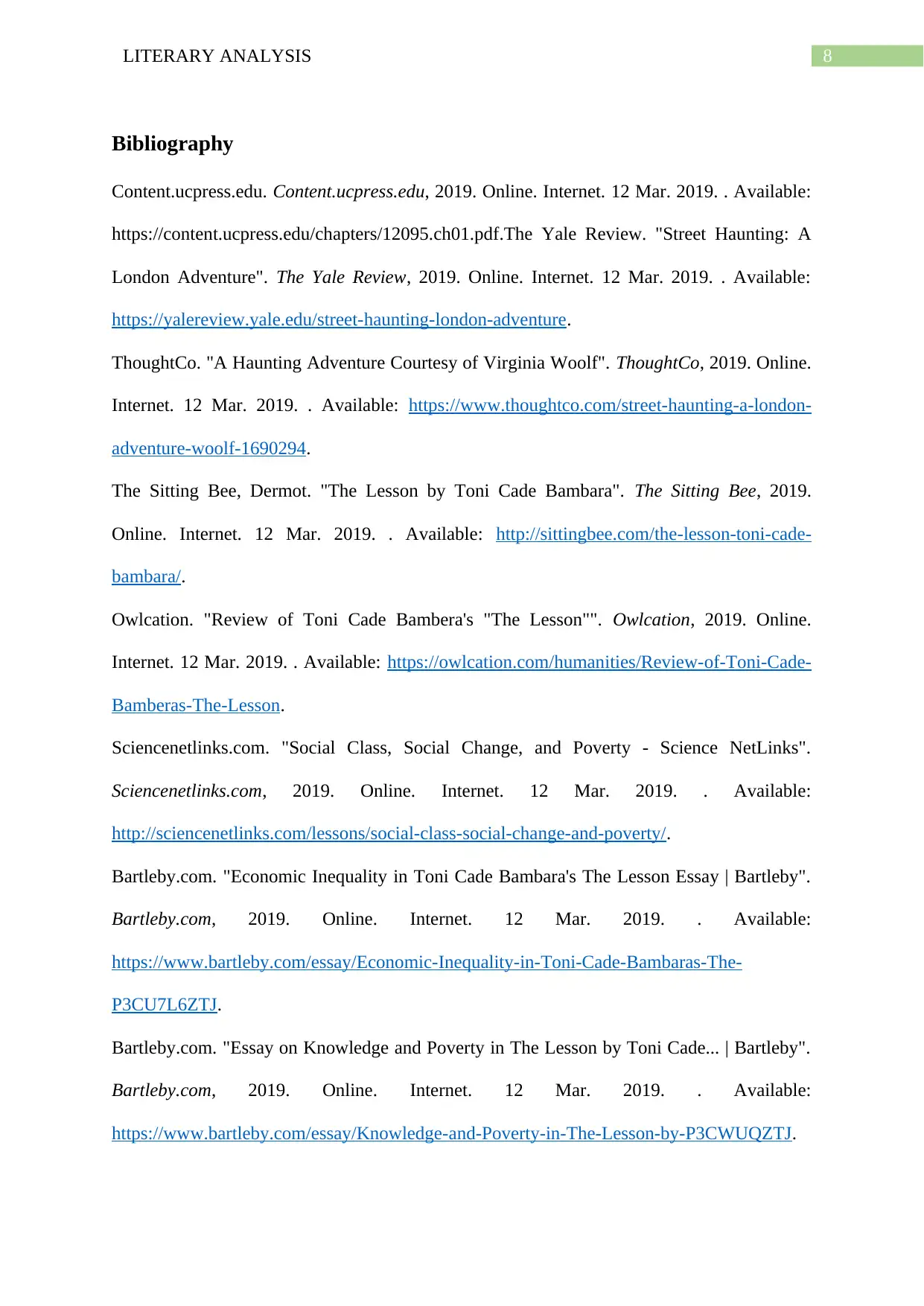
8LITERARY ANALYSIS
Bibliography
Content.ucpress.edu. Content.ucpress.edu, 2019. Online. Internet. 12 Mar. 2019. . Available:
https://content.ucpress.edu/chapters/12095.ch01.pdf.The Yale Review. "Street Haunting: A
London Adventure". The Yale Review, 2019. Online. Internet. 12 Mar. 2019. . Available:
https://yalereview.yale.edu/street-haunting-london-adventure.
ThoughtCo. "A Haunting Adventure Courtesy of Virginia Woolf". ThoughtCo, 2019. Online.
Internet. 12 Mar. 2019. . Available: https://www.thoughtco.com/street-haunting-a-london-
adventure-woolf-1690294.
The Sitting Bee, Dermot. "The Lesson by Toni Cade Bambara". The Sitting Bee, 2019.
Online. Internet. 12 Mar. 2019. . Available: http://sittingbee.com/the-lesson-toni-cade-
bambara/.
Owlcation. "Review of Toni Cade Bambera's "The Lesson"". Owlcation, 2019. Online.
Internet. 12 Mar. 2019. . Available: https://owlcation.com/humanities/Review-of-Toni-Cade-
Bamberas-The-Lesson.
Sciencenetlinks.com. "Social Class, Social Change, and Poverty - Science NetLinks".
Sciencenetlinks.com, 2019. Online. Internet. 12 Mar. 2019. . Available:
http://sciencenetlinks.com/lessons/social-class-social-change-and-poverty/.
Bartleby.com. "Economic Inequality in Toni Cade Bambara's The Lesson Essay | Bartleby".
Bartleby.com, 2019. Online. Internet. 12 Mar. 2019. . Available:
https://www.bartleby.com/essay/Economic-Inequality-in-Toni-Cade-Bambaras-The-
P3CU7L6ZTJ.
Bartleby.com. "Essay on Knowledge and Poverty in The Lesson by Toni Cade... | Bartleby".
Bartleby.com, 2019. Online. Internet. 12 Mar. 2019. . Available:
https://www.bartleby.com/essay/Knowledge-and-Poverty-in-The-Lesson-by-P3CWUQZTJ.
Bibliography
Content.ucpress.edu. Content.ucpress.edu, 2019. Online. Internet. 12 Mar. 2019. . Available:
https://content.ucpress.edu/chapters/12095.ch01.pdf.The Yale Review. "Street Haunting: A
London Adventure". The Yale Review, 2019. Online. Internet. 12 Mar. 2019. . Available:
https://yalereview.yale.edu/street-haunting-london-adventure.
ThoughtCo. "A Haunting Adventure Courtesy of Virginia Woolf". ThoughtCo, 2019. Online.
Internet. 12 Mar. 2019. . Available: https://www.thoughtco.com/street-haunting-a-london-
adventure-woolf-1690294.
The Sitting Bee, Dermot. "The Lesson by Toni Cade Bambara". The Sitting Bee, 2019.
Online. Internet. 12 Mar. 2019. . Available: http://sittingbee.com/the-lesson-toni-cade-
bambara/.
Owlcation. "Review of Toni Cade Bambera's "The Lesson"". Owlcation, 2019. Online.
Internet. 12 Mar. 2019. . Available: https://owlcation.com/humanities/Review-of-Toni-Cade-
Bamberas-The-Lesson.
Sciencenetlinks.com. "Social Class, Social Change, and Poverty - Science NetLinks".
Sciencenetlinks.com, 2019. Online. Internet. 12 Mar. 2019. . Available:
http://sciencenetlinks.com/lessons/social-class-social-change-and-poverty/.
Bartleby.com. "Economic Inequality in Toni Cade Bambara's The Lesson Essay | Bartleby".
Bartleby.com, 2019. Online. Internet. 12 Mar. 2019. . Available:
https://www.bartleby.com/essay/Economic-Inequality-in-Toni-Cade-Bambaras-The-
P3CU7L6ZTJ.
Bartleby.com. "Essay on Knowledge and Poverty in The Lesson by Toni Cade... | Bartleby".
Bartleby.com, 2019. Online. Internet. 12 Mar. 2019. . Available:
https://www.bartleby.com/essay/Knowledge-and-Poverty-in-The-Lesson-by-P3CWUQZTJ.

9LITERARY ANALYSIS
Roanestate.edu. "Literary Analysis: Using Elements of Literature". Roanestate.edu, 2019.
Online. Internet. 12 Mar. 2019. . Available: https://www.roanestate.edu/owl/elementslit.html.
Gale, Cengage Learning. A Study Guide for Toni Cade Bambara's" Lesson". Gale, Cengage
Learning, 2016.
Woolf, Virginia. Street Haunting: A London Adventure. Read Books Ltd, 2016.
Roanestate.edu. "Literary Analysis: Using Elements of Literature". Roanestate.edu, 2019.
Online. Internet. 12 Mar. 2019. . Available: https://www.roanestate.edu/owl/elementslit.html.
Gale, Cengage Learning. A Study Guide for Toni Cade Bambara's" Lesson". Gale, Cengage
Learning, 2016.
Woolf, Virginia. Street Haunting: A London Adventure. Read Books Ltd, 2016.
⊘ This is a preview!⊘
Do you want full access?
Subscribe today to unlock all pages.

Trusted by 1+ million students worldwide
1 out of 9
Your All-in-One AI-Powered Toolkit for Academic Success.
+13062052269
info@desklib.com
Available 24*7 on WhatsApp / Email
![[object Object]](/_next/static/media/star-bottom.7253800d.svg)
Unlock your academic potential
© 2024 | Zucol Services PVT LTD | All rights reserved.

